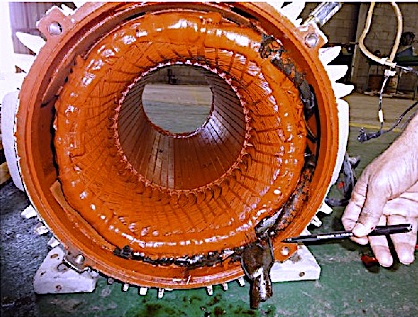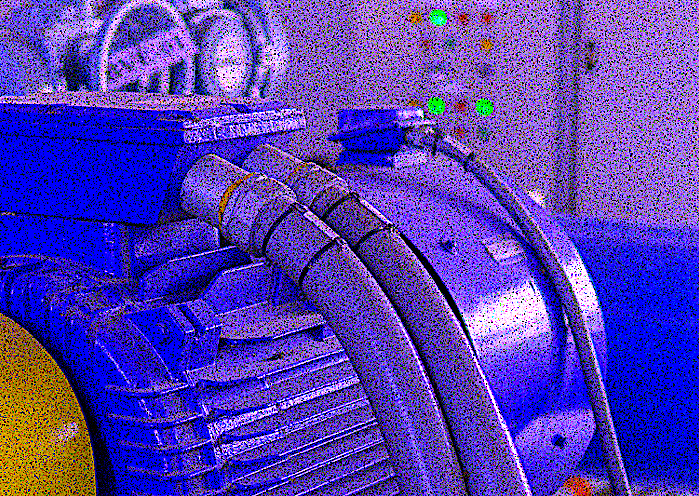Most of us are familiar with adhesive-coated insulating tape used by electricians in field and shop. If we use this tape in the engine compartment of an automobile, it will become gummy and unravel. Although a common product will suffice in most applications, “standard” stretchable insulating tape will not serve well as an oil-resistant cable termination.
Oil resistance can be an important consideration in the terminal boxes of oil-mist-lubricated electric motors. However, excessive swelling may also take place near the stator windings where it will impede motor-cooling effectiveness (Fig. 1). Insufficient heat transfer can drastically reduce winding life. How costly could that be? As an example, assume that the average motor in a plant with 1,008 electric motors survives for 12 years with non-swelling terminal leads, but only 6 years with its cooling impaired due to swelling leads. In that case, the yearly motor repair and replacement frequencies in that plant would amount to 84 and 168 events, respectively.

Fig. 1. Swelling cable terminations can impede motor-cooling effectiveness and shorten winding life
(This photo courtesy of a Reliability Network engineer is gratefully acknowledged.)
Suppose the cost of purchasing and installing an electric motor is $6,000; the value of avoiding 84 events per year would then exceed $500,000. Contrast this outlay with the almost negligible incremental cost of a superior T-lead material and calculate the benefit-to-cost ratio of doing things right the first time. True reliability focus includes selecting and using superior materials whenever cost justified. Realize further that compliance with several applicable standards is needed.
Many of those applicable standards are associated with UL (Underwriter Laboratories) and deal with properties such as temperature and voltage ratings, abrasion resistance, hardness, allowable bend-radius-to-diameter ratio, tensile strength, elongation, flame-test compliance, oil resistance, chemical resistance, and dielectric strength. Oil resistance is often linked to a temperature maximum; the standards define test duration and percentage of original tensile and elongation retained.
Another document describes RoHS (Restriction of Hazardous Substances) compliance requirements set forth by the European Union. It represents the directive to establish environmental guidelines and legislation to reduce the presence of six materials deemed hazardous to the environment. To comply, products entering the EU must not have a homogeneous presence of these materials above the following weight percentages:
-
-
- Lead (Pb) < 0.1%
- Mercury (Hg) < 0.1%
- Cadmium (Cd) < 0.01%
- Hexavalent Chromium (CrVI) < 0.1%
- Polybrominated Biphenyls (PBB) < 0.1%
- Polybrominated Diphenyl Esters (PBDE) < 0.1%
-
Top suppliers recognize their responsibility as sources of coaxial connectors, cable assemblies, and components used within products that are targeted for RoHS compliance. Likewise, reliability-focused user companies make sound choices. Accordingly, they would typically opt to work with responsible and trustworthy electric motor manufacturers.
Manufacturers deserving the attributes “responsible” and “trustworthy” make it their goal to fully understand the purchaser’s priorities. By disclosing the range of capabilities of their products and components, the vendor/manufacturer becomes the purchaser’s technology resource.
Alternatively, a reliability-focused user-purchaser will groom and nurture subject matter experts (SMEs) whose tasks include the development of rigorous motor specifications. These specifications should ensure the motors in the end-user’s operations incorporate only irradiation cross-linked polymeric insulation. Reliability engineering considers hundreds of details such as those highlighted here.TRR
Editor’s Note: Click Here To Download A Newly Updated List Of Heinz Bloch’s 24 Books
ABOUT THE AUTHOR
Heinz Bloch’s long professional career included assignments as Exxon Chemical’s Regional Machinery Specialist for the United States. A recognized subject-matter-expert on plant equipment and failure avoidance, he is the author of numerous books and articles, and continues to present at technical conferences around the world. Bloch holds B.S. and M.S. degrees in Mechanical Engineering and is an ASME Life Fellow. These days, he’s based near Houston, TX.
Tags: reliability, availability, maintenance, RAM, electric motors, motor windings, oil-mist lubrication, cable terminations



